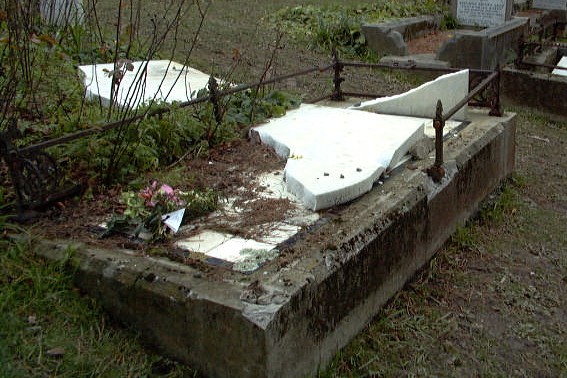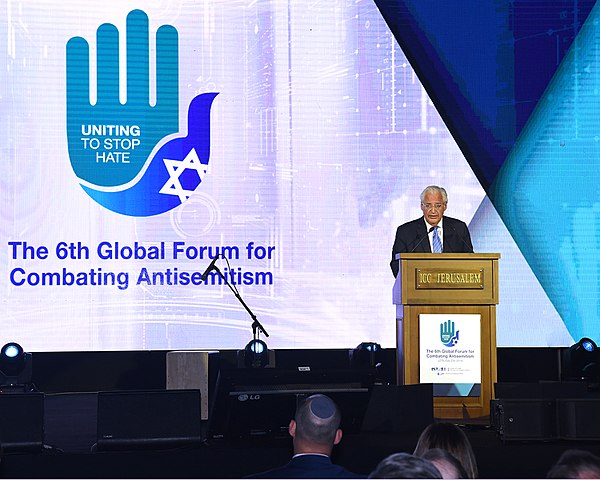GlobalPlus: Perspectives from Australia and New Zealand on Anti-Semitism Today

Rising tide of anti-Semitism leaves no region untouched
Published Courtesy of ARDA
The leafy middle class suburb of Cremorne is not known as a Jewish area
of Sydney, but about a hundred or so aging Jewish families in our neighborhood have been served by a small and elegant Orthodox synagogue that was founded in 1960.
Blending in with the other Catholic, Anglican and Uniting churches nearby, it came as a shock when this house of worship recently was desecrated by Nazi swastikas painted over the front and sides of the building.
I was less surprised when the swastikas appeared a week earlier in the predominantly Jewish area of Bondi, where Orthodox Jews, conspicuous in their broad-brimmed black hats, have been subject to increasing verbal and physical assaults while walking home on the Sabbath.
But these are no longer isolated incidents anywhere.
The official reports of rising anti-Semitism in Australia, where Jews number less than half of 1 percent of the nearly 25 million population, have kept pace with those in Europe, Britain and America, and have instilled deep fears in Jewish citizens.
All our synagogues, schools and community centres have had hi-tech security and guards for years. But since the mass killing of 11 Jewish worshippers during the Sabbath service of the Tree of Life synagogue in Pittsburgh last October, the fear that it could happen here is real.
Robert Bowers, who reportedly shouted All Jews must die,
had previously posted anti-Semitic comments against the Hebrew Immigrant Aid Society, accusing them of supporting migrants who kill our people.
It was a classic example of anti-Semitic conspiracy beliefs which hold Jews responsible for every real or imagined social adversity.
It is not a new phenomenon; it could be said that Jews have become accustomed to living with the oldest hatred.
Ever since the Christian church characterised the people, Israel, as Christ killers,
forsaken by God, and condemned to wander the earth, they have been subject to unprovoked punitive measures, persecution, and pogroms.
Martin Luther’s charge to burn the synagogues of Satan
is directly linked to Hitler’s command 500 years later to do the same on November 9 and 10, 1938. In two days, more than 1,000 synagogues were torched or damaged, as well as thousands of Jewish businesses. Over 100 Jews were killed, and 30,000 Jewish men were arrested.
It was the dress rehearsal for the Holocaust that would take 6,000,000 Jewish lives, 1.5 million of them children, from a total of 9.5 million European Jews in a deliberate campaign of liquidation in Nazi-occupied Europe from 1941 to 1945.
In some ways, it is a different time.
Official attitudes have changed since the Crusades and the Inquisition, giving way to images of a Catholic pope visiting a Rome synagogue and calling the Jewish people our dearly beloved (elder) brothers.
A growing interfaith movement has brought Jewish people together with Christians, Muslims and people of other beliefs to work for peace and understanding in thousands of communities across the globe.
Still, anti-Semitism, defined as words and actions that dehumanize, condemn and promote hatred against Jewish people based on deceitful, false stereotypes, continues to be widespread.
The question becomes: What can each of us do?
Anti-Semitism: An ancient horror
While the Holocaust occurred over 70 years ago, most Jews cannot forget its devastating effects on their family lives. Nor are they permitted to, since Nazi emblems and ideology are popular among today’s far right groups.
For example, the Antipodean Resistance, which claims 300 members, openly espouses National Socialism (Nazism), threatens Jewish Australians and accounts for more than a third of the 366 incidents reported in the Executive Council of Australian Jewry’s 2018 Report on Antisemitism in Australia. AR’s poster, depicting a hooked nosed stereotype of a sinister Jew holding the strings to the Australian flag, is emblazoned with a swastika and the message Reject Jewish Poison.
Recently, the New South Wales branch of the National Party, Australia’s fourth largest party, has investigated about 35 of its members for their links to far right organisations, including the Lads Society, which targeted Muslims in 2015-2017 and has now turned its attention to vilifying Jews, praising the Holocaust, using fascist salutes and posing with white power symbols.
Similar developments can be found in the emboldened anti-Semitic tide of today’s Europe.
The latest example is the Belgian street celebration in Aalst, part of the annual 40-day period before Easter, which paraded giant puppets of grimacing Orthodox Jews, one with a white rat on his shoulder, who are sitting atop piles of money. It is a typical anti-Semitic stereotype taken from Nazi propaganda circa 1939.
In France, where Jews are less than 1 per cent of the population, they were the object of nearly 40 per cent of violent acts classified as racially or religiously motivated. French President Emmanuel Macron told Jewish community leaders that anti-Semitism in France had reached its worst levels since WWII, with a spate of desecrations, including 80 gravestones in a Jewish cemetery in eastern France spray-painted with swastikas.
The renowned American historian of anti-Semitism, Deborah Lipstadt, has attributed the growth of anti-Jewish prejudice to a general rise of right-wing ideology, which in Europe has been fueled by large influxes of refugee populations from the Middle East and Africa.
Being a defensive reactionary stance, which sees Christian Europe under threat, it has also deployed the tropes of antisemitism, which believes that ‘the Jews are behind everything’ pulling the strings of international government, controlling the world bank and the media.
These examples fall within the working definition of antisemitism that was adopted in 2016 by the International Holocaust Remembrance Alliance an organization including 31 democratic member States, 11 Observer and Liaison States, the United Nations, UNESCO and the Council of Europe.
The criteria include
Making mendacious, dehumanizing, demonizing, or stereotypical allegations about Jews as such or the power of Jews as collective — such as, especially but not exclusively, the myth about a world Jewish conspiracy or of Jews controlling the media, economy, government or other societal institutions;
Using the symbols and images associated with classic antisemitism (e.g., claims of Jews killing Jesus or Jews killing children for their blood,
the blood libel) to characterise Israel or Israelis.
In the polarized world of today, where national identity movements fuel prejudice against entire groups, hatred of the other
appears to have become easier to exploit and harder to address.

Prejudice, identity politics and hate
We know from a powerful and growing body of research that there is no region or world religion or secular government that is exempt from denying religious freedoms. Moreover, a consistent research finding is that religious minorities are the most frequent targets for receiving reduced freedoms, increased discrimination and open persecution in the form of violence.
Many Muslim-Majority nations are among the most obvious violators of religious freedom.
Ed Husain, a senior fellow at the Civitas think tank in London, notes in his new book, The House of Islam: A Global History, that anti-Semitism is widespread in many parts of the Muslim world. For some, The word Yahud or Jews has become almost a profanity, bearing connotations of perennial enmity and plotting against Islam and Muslims.
Just as Husain insists that antisemitism never has been, and cannot be allowed to become, the mainstream position of Muslims globally,
so, too, are their Jewish voices who insist their own community must confront Islamophobia.
No community is free from extremist views especially where nationalism is concerned, and many worry about the current Israeli prime minister’s Benjamin Netanyahu’s strong ties to global strongmen who violate human rights and his embrace of racist
anti-Arab parties to shore up support at home.
But there is a difference between civil disagreements on public policy issues, and movements that can embolden individuals such as the mass murderers who slaughtered worshippers at a Jewish synagogue in Pittsburgh and two mosques in New Zealand.
The actions and policies of Israel, like any state or organization, must be open to critical analysis and freedom of conscience with impunity.
But lapsing into derogatory, racial or religious generalizations about the people
on the other side, using pre-existing stereotypes, such as those that have been endemic to anti-Semitism, must be avoided at all costs. They merely perpetuate division and distrust and prevent engaging with the full facts of history.

Signs of hope
There are signs of a backlash against the politics of hate.
For example, in Australia and New Zealand, the recent tour of a controversial Polish radio host, Stanislaw Michalkiewicz, was met with outrage. Michalkiewicz, who accuses Jews of extorting his government and reportedly said that Auschwitz is only closed temporarily,
was denounced by the president of the Australian Institute of Polish Affairs, Aleksander Gancarz. Gancarz said Michalkiewicz’s past public statements breach the boundaries of the common moral code and civility. They are extreme and offensive, especially to the Jewish community.
In Indonesia, the General Secretary of the largest Sunni organisation, Nahdlatul Ulama, representing 60 million Muslims, Yahya Cholil Staquf, risked reprisals back home when he participated in an interfaith panel in Israel in 2018. Staquf said there needs to be a new discourse
to recognize that Muslims and non-Muslims are equal and should be able to coexist peacefully. (The visit did prompt street protests in Indonesia.)
Nor should one overlook the rise of interfaith efforts.
Although global news often focuses on the sensational and negative actions of extremists, the reality is that there has never at any point in human history
been such positive developments in interreligious relations, says Rabbi David Rosen, international director of interreligious affairs for the American Jewish Committee.
Many organisations now exist to promote interfaith understanding, and in particular to address the growth of anti-Semitism, which is found on both the right and the left of politics, and in the Christian as well as the Muslim communities.
In Australia, Courage to Care, which was developed by the B’nai B’rith Anti-Defamation Commission, is a travelling exhibition and educational experience, that grew out of the Holocaust testimony of people saved by non-Jews who had the courage to care.
It is designed to combat racism in all its forms.
Together for Humanity brings Jewish, Christian and Muslim students together and through participatory exercises helps them to overcome prejudice, religious enmity, cultural difference and racism.
At a higher level, the Jewish Christian Muslim Association of Australia, the JCMAA, is a national organisation promoting interfaith understanding and friendship among the three Abrahamic religions in Australia. It has sponsored joint journeys to Jerusalem in which profound responses, knowledge, experiences and mutual understandings are deepened.
It will not be easy. Science and experience teaches us it is difficult for some members of in-groups, particularly those who feel threatened or persecuted by those outside their group, to transcend old grievances. For example, a leader at one of the two mosques attacked in New Zealand outraged many in the Jewish community there when he said he felt the Israeli intelligence agency Mossad was behind the massacre by a white supremacist gunman.
But what gives hope are all the voices since the tragedies in Pittsburgh and Christchurch that have united in hope and resolve.
In both cases, there was an outpouring of support for the victims, and a condemnation of the white supremacist ideology that sought to increase conflict among racial and ethnic groups.
Remembering the outpouring of Muslim support and contributions that followed their own tragedy, the Jewish community of Pittsburgh recently responded in kind to the Muslim community in Christchurch.
We recall with love the immediate, overwhelming support Tree of Life received from our Muslim brothers and sisters in Pittsburgh,
the GoFundMe page reads. To the families going through the most difficult moments in your lives: the Jewish community of Pittsburgh is with you. Our hearts are with you. We hold you in our prayers.
In January, Dvir Abramovich, chair of the Australian Anti-Defamation Commission, said meeting the challenge of the rise in anti-Semitism involves calling on the angels of our better nature, to pursue justice and equality, and to declare that blaming minorities for our miseries … is unacceptable.
The consequences of the pyramid of hate are never limited to one group and will destroy us all,
he said.
Each one of us has the power to repair the world of anti-Semitism, and similar evils that promote conflict and injustice and diminish us as human beings.
What choice will we make?
About IARJ Regional Representative Rachel Kohn
Rachael Kohn is an award winning broadcaster on religion for the Australian Broadcasting Corporation, from which she retired after 26 years in 2018, and a founding member of the International Association of Religion Journalists. She’s the author of New Believers, Reimagining God and Curious Obsessions in the History of Science and Spirituality,
and is on the editorial board of The Bonhoeffer Legacy, as well as being a former editor of The Australian Journal of Jewish Studies.
Global Resources on Anti-Semitism
- ARDA National Profiles: View religious, demographic, and socio-economic information for all nations with populations of more than 2 million. Special tabs for each country also allow users to measure religious freedom in the selected nation.
- ARDA Compare Nations: Compare detailed measures on religion on any nation, including religious freedom and social attitudes, with similar measures for up to seven other nations.
- A working definition of anti-Semitism. This was adopted in 2016 by the International Holocaust Remembrance Alliance, an organization including 31 democratic member States, 11 Observer and Liaison States, the United Nations, UNESCO and the Council of Europe.
- Reports on anti-Semitism can be found from such sources as the U.S. International Religious Freedom Report, the Anti-Defamation League, the Simon Wiesenthal Center and the Anti-Semitism Monitor.
Articles on Anti-Semitism
- Feldman, David, Toward a History of the Term
Anti-Semitism
. Recognizing the layers of meaning that lie within the concept of anti-Semitism will help us understand why the term has become so contentious in the present, the author says. - Finke, Roger, and Briggs, David, GlobalPlus: Religious Freedom. This comprehensive overview examines the roots, prevalence and consequences of the denial of religious freedoms throughout the world. A consistent research finding is that religious minorities are the most frequent targets for receiving reduced freedoms, increased discrimination and open persecution.
- Kohn, Rachael, A joint journey to Jerusalem. When you take religion seriously it unites rather than divides humanity, according to the 12 Jews, Christians and Muslims who travelled from Melbourne on a joint journey to Jerusalem.
- Nossiter, Adam,
They Spit When I Walked in the Street
: the New Antisemitism in France. Nearly 40 percent of violent acts classified as racially or religiously motivated were committed against Jews in 2017, though Jews make up less than 1 percent of France’s population.
Books on Anti-Semitism
- Dawidowicz, Lucy, The War Against the Jews: 1933-1945 The classic book tells the story of the Holocaust—from the historic evolution of anti-Semitism to the ultimate tragedy of the Nazi’s Final Solution.
- Husain, Ed. The House of Islam: A Global History. The author examines contemporary issues such as anti-Semitism in this historical overview.
- Lipstadt, Deborah E., Antisemitism: Here and now. The prominent historian examines the modern resurgence of anti-Semitism.
- Jaspers, Karl, A Question of German Guilt. This important philosophical work written after the Nazi government fell challenged everyone, from the German people to others around the world who remained inactive or silent, to consider their own moral responsibility for the Holocaust and other crimes against humanity.
- Schweitzer, Frederick, and Perry Matthew, Antisemitism: Myth and Hate from Antiquity to the Present. The authors analyze the lies, misperceptions, and myths about Jews and Judaism that anti-Semites have propagated throughout the centuries.
Photo Credits
Image by Carolynimhoff, via Wikimedia Commons [CC BY-SA 4.0]
Image by Matty Stern/U.S. Embassy Tel Aviv, via Wikimedia Commons [CC BY 2.0]
Image by 燃灯, via Wikimedia Commons [CC BY-SA 4.0]
